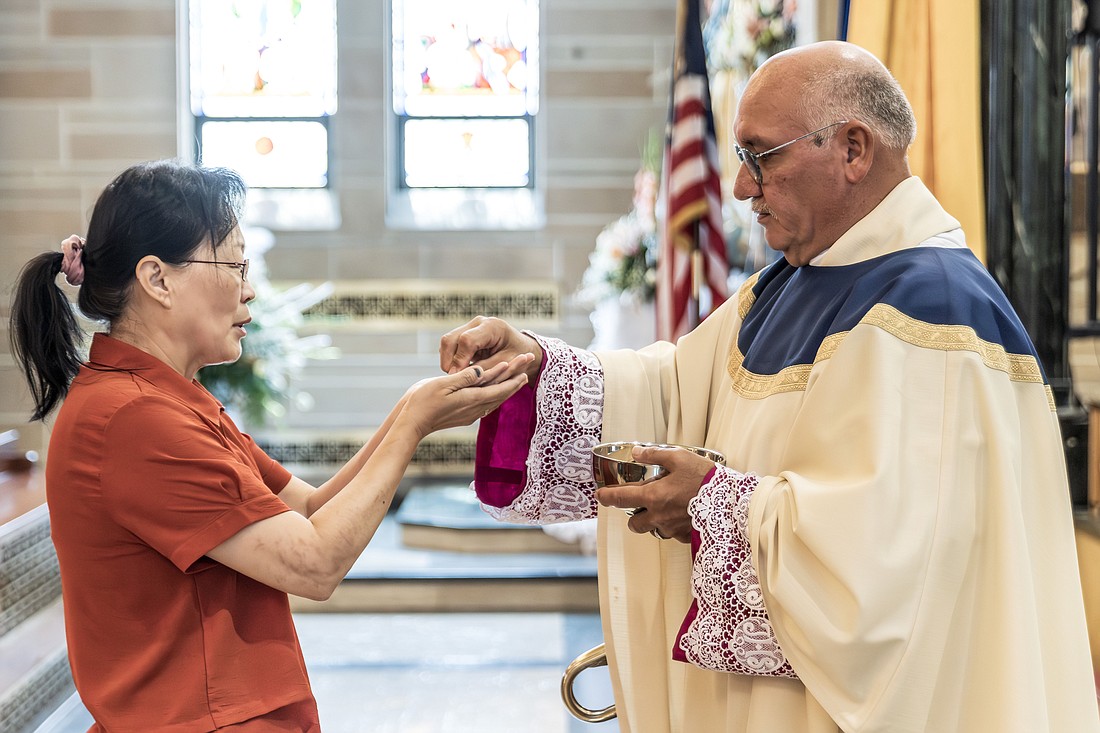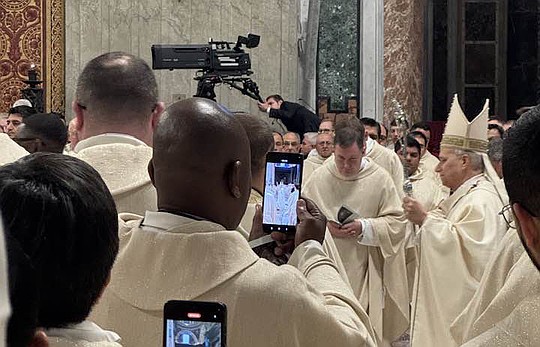Father Koch: Why do some disciples of Jesus choose to walk away?
August 23, 2024 at 5:18 a.m.

Gospel reflection for Aug. 25, 2024, 21st Sunday in Ordinary Time
The dialogue between Jesus and the crowd that followed him to Capernaum after the multiplication of the loaves and fishes reaches a fever pitch as we bring to a conclusion our read through Chapter six of John’s Gospel this weekend.
As Jesus has emphasized the command to eat his Flesh and drink his Blood as a necessary component of having the eternal life which he has promised to his followers, the crowd becomes increasingly hostile to his teaching.
This dialogue draws together many teachings that Jesus has already delivered at various other points in the Gospel. He emphasized the importance of the Spirit as the source of life, repudiating the acts of the Flesh, or the Law, as a means to salvation, a theme that carries over into the writings of St. Paul.
Jesus also reiterates the imagery of the Son of Man ascending to from when he came, pointing out again (as we first see in the first chapter of John) incarnational theology and his relationship with the Father. Jesus is the Bread that comes down from heaven; the Son of Man who ascends to heaven. His words are “spirit and life” noting that the works of the Flesh are of no consequence.
The only Flesh that has importance is his own Flesh, given as food to those who believe in him. In a sense he gives mortal beings his Flesh to eat and Blood to drink so that they may be transformed into spiritual beings, now no longer just fleshy beings.
When we eat his Flesh and drink his Blood we are then transformed to be like him; to step out of this world while yet remaining, for a time, in this world. Our home then becomes not this world but the eternal life prepared for us, into which we are baptized and nourished.
The crowd didn’t want to hear what Jesus had to say. They already thought that they knew who he was. The eschatological language that he employed to explain to them his life, his mission and their participation in eternal life was lost in their inability to accept that they had to “eat [his] flesh and drink [his] blood
John then notes: As a result of this, “many of his disciples returned to their former way of life and no longer accompanied him.”
They did not believe him, nor did they believe in him.
In his homily at the close of the Eucharistic Congress last month, Cardinal Luis Tagale stated: “As a result of this, many of his disciples left him, leaning … They returned to a way of life without Jesus. They chose his absence rather than his presence … Instead of accompanying him, they walked alone. Their rejection of the gift of Jesus’s word, body, and blood meant that they would not walk with him. And neither could he send them on mission. I invite you … to pause and ask rather painful questions about this mysterious rejection of Jesus by his disciples. Is it possible that we, his disciples, contribute to the departure of others from Jesus? Why do some people leave when Jesus is giving them the precious gift of eternal life?”
Almost every Catholic family -- indeed every family of any Christian communion -- struggles with the reality that members of that family leave the practice of faith. It is difficult enough to deal with those who move from one ecclesiam community to another, but especially challenging when our loved ones abandon faith altogether.
Some do find the dogma and creeds of the faith difficult. As with this crowd who walked away from Jesus, there are people who cannot understand one dogma or another. Others leave the faith because they are unable to see their lifestyle in accord with the faith. They choose lifestyle over faith, though often this is short lived.
But the Cardinal poses a difficult challenge for all of us. How many people walk away because we, faithful disciples, are stumbling blocks?
Do I live and love as though I am now a spiritual person and not a person of the flesh? For as long as our desires to manipulate and control, to live in disconsonance with the faith we profess, to lack mercy, forgiveness, and compassion, we become barriers to the faith, and not gateways.
Peter gets it right: “Master, to whom shall we go? You have the words of eternal life.”
That is not a passive insight, or one that comes only on the level of assent, but rather demands of us a change in life, a transformation of personhood, reflecting that, having eaten the Body and Blood of the Lord, we are now like him and not the rest of the world.
Father Garry Koch is pastor of St. Benedict Parish, Holmdel.
Related Stories
Thursday, January 08, 2026
E-Editions
Events
Gospel reflection for Aug. 25, 2024, 21st Sunday in Ordinary Time
The dialogue between Jesus and the crowd that followed him to Capernaum after the multiplication of the loaves and fishes reaches a fever pitch as we bring to a conclusion our read through Chapter six of John’s Gospel this weekend.
As Jesus has emphasized the command to eat his Flesh and drink his Blood as a necessary component of having the eternal life which he has promised to his followers, the crowd becomes increasingly hostile to his teaching.
This dialogue draws together many teachings that Jesus has already delivered at various other points in the Gospel. He emphasized the importance of the Spirit as the source of life, repudiating the acts of the Flesh, or the Law, as a means to salvation, a theme that carries over into the writings of St. Paul.
Jesus also reiterates the imagery of the Son of Man ascending to from when he came, pointing out again (as we first see in the first chapter of John) incarnational theology and his relationship with the Father. Jesus is the Bread that comes down from heaven; the Son of Man who ascends to heaven. His words are “spirit and life” noting that the works of the Flesh are of no consequence.
The only Flesh that has importance is his own Flesh, given as food to those who believe in him. In a sense he gives mortal beings his Flesh to eat and Blood to drink so that they may be transformed into spiritual beings, now no longer just fleshy beings.
When we eat his Flesh and drink his Blood we are then transformed to be like him; to step out of this world while yet remaining, for a time, in this world. Our home then becomes not this world but the eternal life prepared for us, into which we are baptized and nourished.
The crowd didn’t want to hear what Jesus had to say. They already thought that they knew who he was. The eschatological language that he employed to explain to them his life, his mission and their participation in eternal life was lost in their inability to accept that they had to “eat [his] flesh and drink [his] blood
John then notes: As a result of this, “many of his disciples returned to their former way of life and no longer accompanied him.”
They did not believe him, nor did they believe in him.
In his homily at the close of the Eucharistic Congress last month, Cardinal Luis Tagale stated: “As a result of this, many of his disciples left him, leaning … They returned to a way of life without Jesus. They chose his absence rather than his presence … Instead of accompanying him, they walked alone. Their rejection of the gift of Jesus’s word, body, and blood meant that they would not walk with him. And neither could he send them on mission. I invite you … to pause and ask rather painful questions about this mysterious rejection of Jesus by his disciples. Is it possible that we, his disciples, contribute to the departure of others from Jesus? Why do some people leave when Jesus is giving them the precious gift of eternal life?”
Almost every Catholic family -- indeed every family of any Christian communion -- struggles with the reality that members of that family leave the practice of faith. It is difficult enough to deal with those who move from one ecclesiam community to another, but especially challenging when our loved ones abandon faith altogether.
Some do find the dogma and creeds of the faith difficult. As with this crowd who walked away from Jesus, there are people who cannot understand one dogma or another. Others leave the faith because they are unable to see their lifestyle in accord with the faith. They choose lifestyle over faith, though often this is short lived.
But the Cardinal poses a difficult challenge for all of us. How many people walk away because we, faithful disciples, are stumbling blocks?
Do I live and love as though I am now a spiritual person and not a person of the flesh? For as long as our desires to manipulate and control, to live in disconsonance with the faith we profess, to lack mercy, forgiveness, and compassion, we become barriers to the faith, and not gateways.
Peter gets it right: “Master, to whom shall we go? You have the words of eternal life.”
That is not a passive insight, or one that comes only on the level of assent, but rather demands of us a change in life, a transformation of personhood, reflecting that, having eaten the Body and Blood of the Lord, we are now like him and not the rest of the world.
Father Garry Koch is pastor of St. Benedict Parish, Holmdel.










